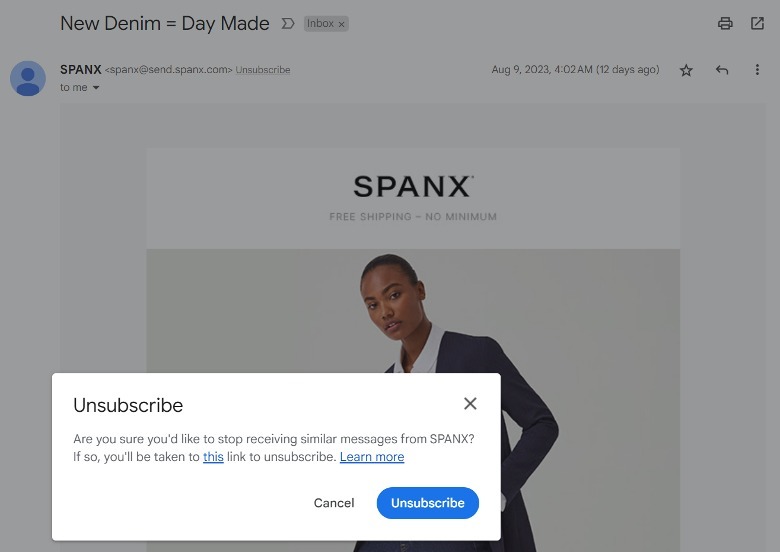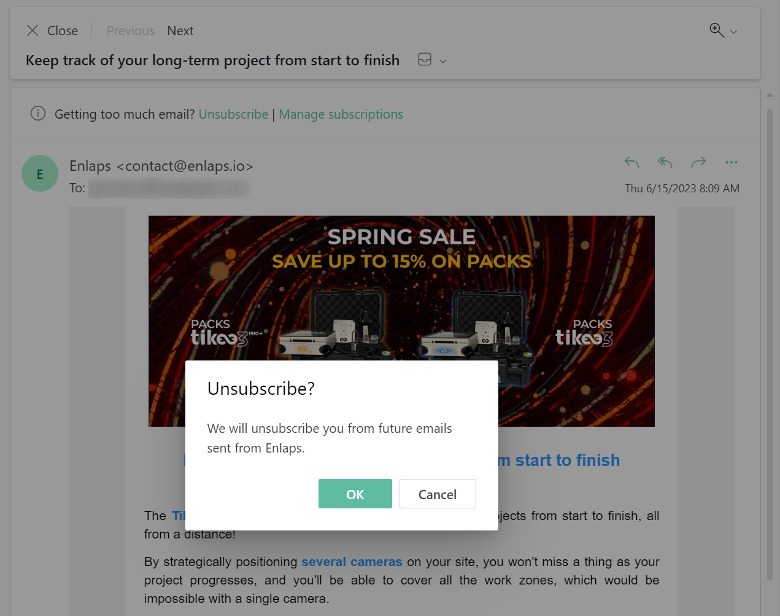

How To Unsubscribe From Annoying Emails
source link: https://www.slashgear.com/1371962/how-to-unsubscribe-annoying-emails/
Go to the source link to view the article. You can view the picture content, updated content and better typesetting reading experience. If the link is broken, please click the button below to view the snapshot at that time.

How To Unsubscribe From Annoying Emails

Maintaining a zeroed-out email inbox takes a lot of time and effort these days. It can become an even bigger chore if you're a student juggling email threads, a professional in an industry that requires nonstop back-and-forth communication with clients and contacts, or a person who simply signs up for all kinds of online accounts. As long as you actively use an email for online communication, chances are extremely high that you receive persistent junk mail regularly.
Of course, there are things you can do to gain control of an inbox perennially riddled with unsolicited messages such as mark items as spam or mass-delete unread emails from senders you don't know or are not expecting to hear from. Both options can become quite tedious though because more often than not, you'd have to keep repeating the task on a daily basis, if not multiple times a day.
If you're tired of manually deleting massive amounts of incessant messages from your inbox, below are some ways you can explore to stop receiving emails from various sources.
Click the unsubscribe link for individual email messages

Most newsletters and promotional emails will offer you a way to stop receiving future messages right on the email itself. It's usually in the form of a clickable link located at the very end of the message, oftentimes in a smaller font so it can be very easy to miss it completely. Depending on the content of the email, the unsubscribe link may be cleverly placed within a disclaimer paragraph in the same font color, so make sure you read through the last few blocks of text and scan for the phrase, "click here to unsubscribe" or something similar. For visual emails, the unsubscribe option may be located at the footer of the page, along with other website links.
When accessed on a desktop computer, some email service providers have the ability to detect if a certain email seems to be sent using a mailing list or if the message has an unsubscribe link included. When it does, it conveniently brings the option to the top of the page, where you can easily click on it to stop future promotional correspondence.

On Gmail, the "Unsubscribe" link can be found right next to the sender's email address on an open message. Clicking on it may pull up an Unsubscribe pop-up onscreen, on which you'd need to verify the action. You may be redirected to the sender's website so you can unsubscribe or change your email preferences there.

On Microsoft Outlook, a message saying, "Getting too much email?" may appear on top of potential marketing messages. The "Unsubscribe" link should be right next to it. If you own an iPhone or iPad and use its built-in Mail app for email, an "Unsubscribe" link will show up on top of messages that have been detected to come from a mailing list.
Create email filters

If you are dealing with marketing emails that are directly sent to you by individuals rather than generated by businesses or websites you have accounts with, these messages may not be caught by your email client as promotional by nature, so the unsubscribe button may not be generated. To better manage these spammy messages, you can create email automations so that these messages automatically get marked as read, get archived, or get sent to the trash, depending on your preference.
On Gmail, these email automations are called "filters." Here's how to create one:
- On a computer, open Gmail.
- Open an email sent to you by the person whose messages you want to stop receiving.
- Tap the three-dot icon in the top-right corner of the message.
- Select "Filter messages like this."
- This should place the person's email in the Search box, in the From field. Click "Create filter."
- On the next page, choose either "Skip the Inbox (Archive it)," "Mark as read," or "Delete it." Make sure you check "Also apply filter to (x) matching conversation" so all emails sent by the sender are affected by the filter. Finally, hit "Create filter."
You can perform similar steps when you access Microsoft Outlook and Apple Mail on a desktop computer. Once these email rules are in place, future messages from senders whose details fulfill the filter parameters can be quickly junked so you don't have to manually get rid of them.
Modify your communication preferences for websites that often send marketing emails

If the first two methods don't quite work, the most effective way to unsubscribe from annoying emails is by going straight to the source and essentially telling them to quit bugging you. If it is an individual, consider emailing them to remove you from their address book. You may have to block their email address from sending you future messages.
If it is from a website or online platform that you have a profile on, do the following:
- On a computer web browser, visit the website and log in using your username and password.
- Go to your account page.
- Find the menu that lets you manage your account settings.
The menu that contains the option to unsubscribe to promotional emails may vary, depending on the website or platform. For instance, to stop receiving marketing messages from Old Navy, you'd have to go to the Communication Preferences menu, while on Zappos, it'll be under Manage Email Subscriptions. To completely purge your inbox from all emails related to the website in question, make sure you choose the "Unsubscribe from all" option, if available. If you are unable to locate the unsubscribe feature yourself, try getting in touch with customer support for guided assistance.
10 Reasons To Stop Using Google Chrome

Google is perhaps THE Internet company, with dozens of products and services that revolve around the technology that has kept us connected for decades. For most people, the gateway to that Internet is, in fact, another Google product, with Chrome taking up the lion's share of the browser market. It's arguable that Google Chrome is the most used piece of software in the world, given how it's used on almost every computing device imaginable. That doesn't immediately mean, however, that it is the best way to experience the Web, and there are also serious reasons why you would want to avoid using Chrome if you can afford it.
Performance and stability
Just because it's the most used doesn't mean it's the best. There are various factors that have contributed to Chrome's success in the market. And while credit has to be given to some features that did help sell the browser to users, it is far from being the most impressive when it comes to performance and stability. In fact, some Chrome users might even begrudgingly admit that they are forced to use the browser for this or that feature, despite having had many heartaches and headaches over the browser's performance.
The Internet is filled with anecdotes about Chrome's insatiable hunger for RAM and battery power. At a time when people have become more dependent on laptops with relatively limited hardware resources as well as on the Web for work, study, or entertainment, a voracious web browser is probably the last thing they need. Actually, the last thing they need is for Chrome to crash because it ran out of memory or, worse, some bug from an extension.
To be fair, Google has been working to improve Chrome's performance and reduce its footprint, primarily by restricting how much Javascript works behind the background. At the same time, this may sometimes lead to suboptimal user experiences, which Google is also trying to avoid. It does still imply that Chrome is a huge beast by default, one that has to be tamed and put on a diet.
Extensions security
Once upon a time, web browsers competed in the number of third-party add-ons, sometimes known as extensions, they supported. The extension system allowed the browser to remain slim, at least in comparison to the behemoth that was Internet Explorer, while leaving the door open to functionality that the browser developers didn't envision or even intend. That, of course, required that the software had hooks that extensions could connect with to implement those features, which sometimes include being able to modify what users see on a web page or even touch files on a user's computer.
Unfortunately, extensions have also become a source of problems in the long run, endangering the stability of the browser as well as the security of users. Complicating matters is how Google ran its Chrome Web Store, which was even more open than its Google Play Store for Android. In exchange for a more open ecosystem, there was barely any quality control, and a lot of malware-laden extensions were able to slip through the cracks, often masquerading as extensions coming from reputable developers.
Google has been trying to plug up that large hole, but its strategy has been a two-edged sword. It has restricted what extensions can get access to in order to mitigate the negative side effects of harmful extensions but also removed functionality that some extensions needed. Unfortunately, it isn't a done deal either, and there are still some problematic add-ons that get past Google's scrutiny.
Settings bloat
Add-ons and extensions were supposed to make browsers simpler and lightweight, but things didn't always turn out that way in the end. In addition to being a resource-hungry piece of software, Chrome is also a complex one, and its complexity bleeds into its configuration options. Almost like any Google product, Chrome has pages upon pages of settings that the browser itself requires a mini search engine to look for the appropriate controls.
There are pros and cons to this "feature," of course. On the one hand, it gives the user more control over how a browser behaves, allowing them to tweak almost every aspect of the experience. On the other hand, it is almost too easy to get lost in a sea of options, and it's also just as easy to bury important privacy or security settings to discourage users from looking for those. There is, indeed, a search option, but that presumes you know what to look for in the first place.
Slow feature development
Despite being considered to be "heavy," Chrome is ironically slow to actually add new features, at least compared to something like Microsoft Edge or even Opera. Yes, there is a new Chrome release almost every month (though Google is now adjusting that), but that rate only means that most of the changes are bite-sized and focus on fixes rather than big new features.
This means that Chrome doesn't always catch up with the latest trends or users' wishes, but that might be fine for some people. Given the browser's infamy for resource usage, users might definitely prefer that Google focus on polish rather than fluff. Extra functionality could be added by extensions, but the way Google pulled the rug from under those may have caused some disgruntled developers to walk away from the browser entirely.
Ecosystem lock-in
Chrome is one of the most ubiquitous gateways to the Internet, where most of Google's money-making products and services can be found. In other words, it is pretty much the portal into Google's services, and it is becoming increasingly obvious that Google is shaping it up to be like one. It works the other way around as well, and some of the best Chrome features can only be experienced if you are already using other Google products.
There has been an increasing number of features that integrate other Google products into Chrome. While that might seem logical from a business perspective, it also raises regulatory red flags when it comes to anti-competitive and monopolistic business practices. It naturally runs the risk of favoring Google's other products even when a web browser should mostly be indifferent to anything outside of it. Conversely, it also makes it harder to switch away from those other Google products once you're already knee-deep into them, thanks to Chrome.
Tracking and privacy
Google has never been one to be associated positively with privacy, and the company is working hard to change that image. On the Web side of things, it has been heavily advertising its efforts to rid the world of harmful third-party tracking cookies, a laudable effort in itself. Other browser makers have also joined in on that thrust, but not all of them agree with Google's recent proposals on how to do it.
The company might be seen largely as a Search or Internet business, but most of Google's profits really come from its advertising business. Internet advertising will always require a form of tracking, and it has been Google's goal to make the masses more welcoming of those ads and activities by promoting "good ads" and "privacy-respecting" tracking methods. Not everyone buys those promises, though, and Google remains ambiguously in the middle of that battle.
In the meantime, however, Chrome is being used as the testbed of Google's privacy efforts, particularly new technologies designed to block malicious ads and trackers while promoting the good ones. It's still a work in progress, however, and still has to pass regulatory and market scrutiny, especially given how some doubt it will truly work in favor of users' privacy.
False sense of security
Even without those upcoming features, Chrome does have some measures in place designed to protect users' privacy. Some of those sound like your typical browser features, like removing a site's access to certain hardware or incognito mode. Others might be specific to Chrome or were implemented in Chrome first, like blocking non-HTTPS sites or removing FTP functionality.
There are times, however, when those features might not work the way users thought they do or may have caveats that Google didn't exactly explain well. One of the most recent and most popular cases in point is Chrome's Incognito Mode, which isn't as incognito as most presumed. It was only somewhat recently that Google really clarified that safe browsing really offered very minimal protection after advocating its use for years.
Incognito mode really only hides your activity from anyone else using the same device and the same browser or browser profile. It doesn't completely hide your activities from websites that use other methods of tracking your presence. It also doesn't always hide you from Google either, as Chrome will still submit some data to Google's servers for the usual telemetry purposes.
Google monopoly
Although Google can be praised for taking up the cause of banishing harmful cookies and trackers from Chrome and the Web at large, there have been doubts about the company's ulterior motives. In particular, its proposed compromise to replace those cookies is put into question because they seem to benefit Google only, particularly its ad platform business. And, of course, Chrome is being used as the vehicle to push that on the Web.
The aforementioned FLoC, for example, is controversial because it puts Google and Chrome at the forefront. It would, for example, only work with Chrome, and advertisers would have to use Google's platform to be vetted. It sends a message that the only way to be safe on the Web in this new world would be with Chrome and Google. Naturally, that didn't sit well with other browser makers as well as many privacy advocates and industry regulators.
Browser monoculture
Even if Chrome didn't have all these problems, there is one negative side effect that would still appear if almost all people on all platforms used Google's browser. The lack of competition will actually be dangerous not just for Google but for the Web as a whole, leading to a potential slowdown of innovation and development.
Monocultures have never been good, and diversity and competition, at least within an acceptable range, have always helped drive innovation, even in software. Others might call it copying, but new features have become standard when rivals start implementing them because they have become popular or useful. While Chrome's open source Chromium base has become the foundation of many competing web browsers, those browsers, like Microsoft Edge, Opera, and Brave, are introducing new features that challenge the status quo and, at times, change Chrome's direction as well.
Dictating the Web's direction
Perhaps the biggest problem with Chrome's large market share, and the reason why users should turn to potentially better browsers, is that it gives Google too much clout in the direction that the Web is going. If Google decides that Chrome will block sites that use this or that technology or require that sites implement a new feature, most websites will have to adjust to cater to Google's demands. At times, that works in the Web's favor, like pushing HTTPS to become the standard. Other times, however, it seems that Google is the only one to really benefit in the end, like when it "encouraged" websites to use AMP (Accelerated Mobile Pages).
The Web, however, isn't Google's property, and there are a lot of other stakeholders, even if they are dwarfed by Chrome's and Google's market share. There is a real risk and danger that Google will get its way if other browser makers and regulators don't keep their guard up and their ears on the ground, like when Google almost pushed FLoC down everyone's throats. While regular users might not have much say in those matters, they can still put their foot down and help prevent Google from owning the Web by advocating other browsers, even those based on Chromium, especially if they offer a better experience anyway.
Recommend
About Joyk
Aggregate valuable and interesting links.
Joyk means Joy of geeK


